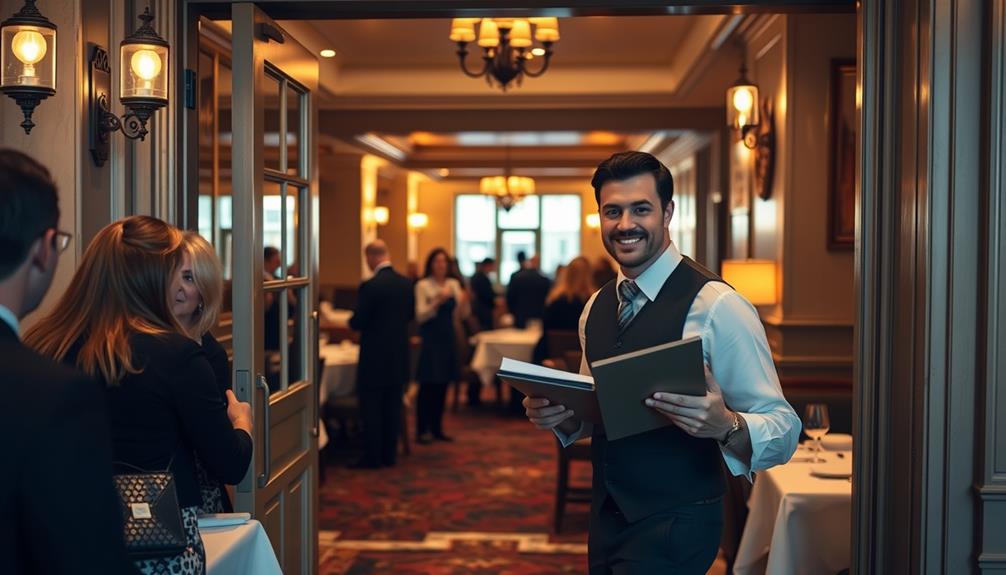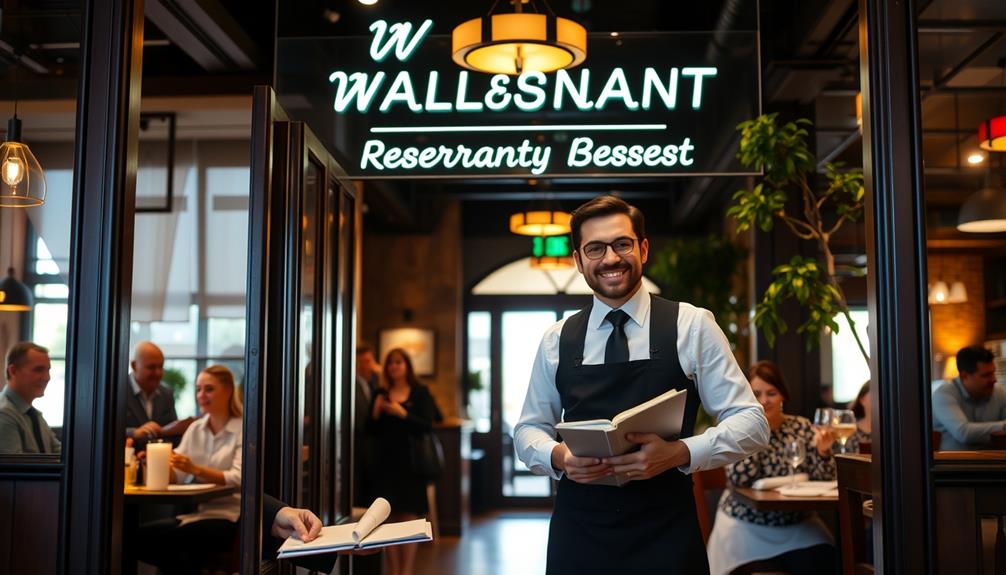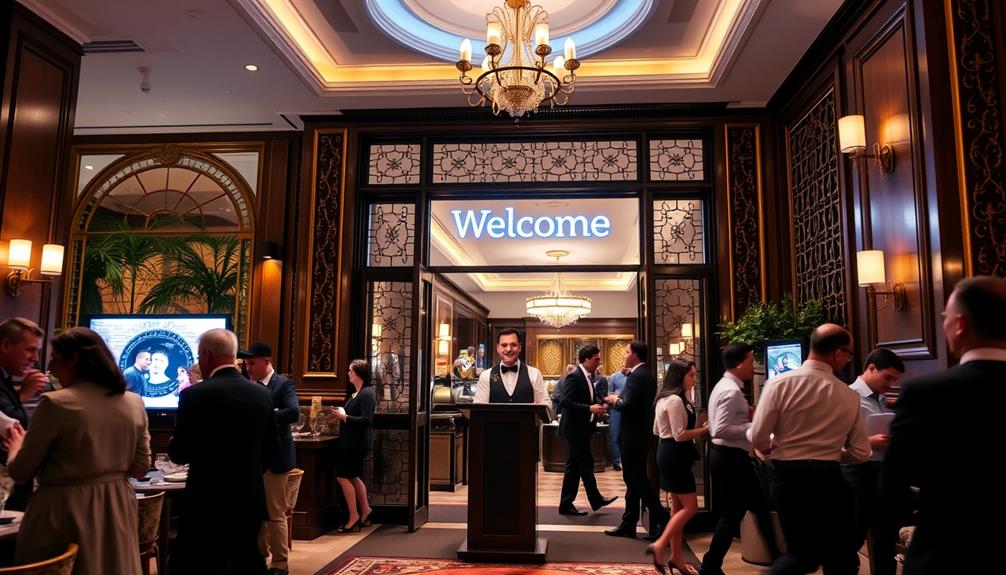A host at a restaurant is your first point of contact upon arrival. They greet you warmly, manage reservations, and set the tone for your dining experience. As they balance seating arrangements, hosts guarantee that server workloads are manageable while maintaining a clean and inviting atmosphere. Strong customer service and organizational skills are crucial in this role, as hosts often multitask and address guest inquiries. They play an important part in creating a positive vibe for everyone at the restaurant. If you're curious about what makes hosts successful and the path to advancement, there's more to explore.
Key Takeaways
- A host is the first point of contact for guests, setting a positive tone upon their arrival at the restaurant.
- Hosts manage reservations and waitlists, providing accurate wait times to enhance guest satisfaction.
- They are responsible for seating guests appropriately, balancing server workloads to ensure smooth service.
- Hosts maintain cleanliness and an inviting atmosphere at the entryway and dining area.
- Effective communication and customer service skills are essential for hosts to address guest needs and enhance their experience.
Role of a Restaurant Host

The role of a restaurant host is fundamental in creating an enjoyable dining experience for guests. As the first point of contact, you greet guests with warmth and set a positive tone right from the entrance. Your efficiency in managing reservations and waitlists guarantees that seating arrangements flow smoothly. Restaurant host responsibilities also include maintaining a clean and organized front of house, and ensuring that guests are promptly seated and attended to. Additionally, hosts are responsible for assisting with any special requests or accommodations, and providing information about the menu or restaurant policies. Overall, the role of a restaurant host is crucial in creating a welcoming and efficient dining atmosphere for guests.
When guests arrive, you provide accurate wait times and keep them informed, which helps alleviate any concerns. Additionally, making sure guests feel welcomed can be enhanced by drawing inspiration from various dining experiences, such as those found in best breakfast spots that emphasize local flavors and community engagement.
Strong communication skills are essential in this role. You'll need to coordinate with servers to communicate guest needs effectively, helping enhance the overall dining experience. Whether it's passing along special requests or addressing any issues, your ability to listen and respond to guest inquiries makes a significant impact.
Moreover, maintaining a clean and organized entryway is part of your responsibility. An inviting atmosphere helps guests feel comfortable and enthusiastic to enjoy their meal.
Key Responsibilities of Hosts

As a restaurant host, your key responsibilities are vital to ensuring a seamless dining experience for guests. You greet guests warmly upon arrival, setting a positive tone that makes them feel welcomed.
One of your primary tasks is managing reservations and waitlists effectively, similar to how professional cleaning services enhance customer satisfaction in restaurants. You communicate accurate wait times to guests, optimizing seating arrangements and enhancing customer service.
Seating guests at appropriate tables is another important responsibility. You balance the flow of customers while considering server workloads, ensuring everyone has a pleasant experience. This careful coordination helps maintain a smooth operation during busy hours.
Additionally, you assist with light cleaning tasks, which includes maintaining the cleanliness of menus and the dining area. A tidy environment contributes greatly to overall guest satisfaction.
Essential Skills for Hosts

Successful hosts possess a mix of essential skills that elevate the dining experience for guests. First and foremost, excellent customer service skills are critical. You're the first point of contact, and your demeanor sets the tone for their visit.
Strong organizational skills come into play as you manage seating arrangements and reservations, ensuring everything runs smoothly during busy times. Additionally, understanding the importance of creating a welcoming atmosphere can enhance guest satisfaction, similar to how cold medications help alleviate symptoms.
Effective communication is another key skill. You need to convey accurate wait times and address guest inquiries while relaying important information between guests and staff. This helps create a seamless experience for everyone involved.
Problem-solving abilities are significant too. You'll often need to quickly address guest concerns and adapt to unexpected challenges in the fast-paced restaurant environment.
Host Training and Onboarding

When you step into the role of a host, understanding the training process is key to your success.
You'll develop essential skills that enhance guest experiences while learning about common financial terms and jargon tailored to your restaurant's unique atmosphere.
This foundation will prepare you to manage reservations and greet guests with confidence.
Training Process Overview
In the initial days of your role as a host, you'll immerse yourself in a structured training process designed to equip you with essential skills and knowledge. This process typically involves a checklist that covers key components, like greeting guests, managing reservations, and understanding the seating chart to optimize guest flow and enhance the dining experience.
To guarantee effectiveness, it's vital to set clear and specific objectives during your training, which can help you track your progress and identify areas for improvement, aligning with goal tracking strategies.
You'll engage in role-playing scenarios tailored for the restaurant industry, allowing you to practice communication and problem-solving skills in real-time situations. Shadowing experienced hosts will also be part of your onboarding, giving you firsthand insights into daily operations and customer interactions in a fast-paced environment.
The training materials are standardized across the establishment, guaranteeing that every hostess aligns with the restaurant's service standards and culture. This consistent onboarding experience is vital for building a team that works seamlessly together, enhancing both your performance and that of your colleagues.
Essential Skills Development
As you complete your initial training, focusing on skill development becomes critical for your success as a host. You'll need to master key responsibilities like greeting guests, managing reservations, and maintaining the waitlist.
Understanding how key domains of development can influence your growth in the role can further enhance your onboarding experience. Using a thorough checklist can help guarantee consistency in your onboarding process, making it easier to adapt to the fast-paced restaurant environment.
Training resources tailored for your role will streamline your learning, allowing you to focus on developing essential skills. On-the-job training is particularly valuable, as you'll learn directly from experienced staff.
Pay attention to their customer service techniques and time management skills; these are imperative for creating a positive experience for diners.
Excellent communication and interpersonal abilities are also essential. You'll often be the first point of contact for guests, so being approachable and friendly can set the tone for their entire visit.
Onboarding Best Practices
A host's successful onboarding sets the stage for a seamless dining experience. To achieve this, it's essential to have a structured checklist that outlines key responsibilities, such as greeting guests, managing reservations, and communicating wait times. This clarity in onboarding guarantees you know what's expected from day one.
Additionally, understanding the importance of consistency in service, akin to maintaining a uniform standard in family photoshoots, can greatly enhance the overall guest experience.
Incorporating role-playing scenarios and shadowing experienced hosts enhances your training and builds confidence. These hands-on experiences allow you to practice in a low-pressure environment, preparing you for real interactions with guests.
Consistency in the onboarding processes is imperative. By maintaining a uniform standard of service across all hosts, you help set the right tone for the dining experience.
On-the-job training is also significant, as it helps you learn directly through interactions, reinforcing your ability to handle real-time situations effectively.
Regular feedback and performance assessments during this onboarding phase are key. They not only identify areas for improvement but also support your ongoing development in important host skills.
Embrace this feedback, and use it to refine your abilities, guaranteeing you're well-prepared to create memorable experiences for every guest you encounter.
Work Environment for Hosts

As a host, you'll find yourself in a fast-paced restaurant environment where every moment counts.
You'll be on your feet for long periods, juggling multiple tasks while interacting with a diverse range of guests.
This dynamic setting not only challenges your physical stamina but also sharpens your communication and teamwork skills.
Additionally, the ability to effectively manage guest expectations is critical, much like how New England offers diverse tent camping locations that cater to various outdoor enthusiasts.
Fast-Paced Restaurant Atmosphere
Maneuvering a fast-paced restaurant atmosphere requires hosts to be quick on their feet and ready to engage with guests at any moment. As the first point of contact, you set the tone for the dining experience. Your ability to manage seating arrangements and waitlists while creating a warm and inviting atmosphere is essential.
In such a lively environment, incorporating techniques to alleviate stress—such as practicing deep breathing—can be beneficial for maintaining composure during busy shifts stress reduction techniques.
In this dynamic environment, you'll face several challenges:
- Effective Communication: You need to relay information seamlessly between guests and staff, ensuring everyone is on the same page.
- Calm Under Pressure: Managing high volumes of guests during peak hours means you must remain composed and handle expectations efficiently.
- Adaptability: With irregular hours, including evenings and weekends, you'll need to adjust to the restaurant's busy service times.
This fast-paced environment demands stamina and energy, as you'll often be on your feet for long periods.
Your role is fundamental in maintaining a smooth operation, contributing greatly to the overall guest experience. Embrace the hustle, and remember that your interactions play a substantial part in making their visit memorable.
Physical Demands of Hosting
While hosting, you'll quickly realize that the physical demands of the job can be quite significant. Working in a fast-paced restaurant environment means you'll be on your feet for long periods, managing guest interactions and seating arrangements. You'll frequently move around the dining area, greeting guests, escorting them to their tables, and coordinating with staff, all while maintaining a welcoming atmosphere.
Additionally, keeping a clean and organized front-of-house area is essential for creating a pleasant dining experience, similar to how proper hamster care involves maintaining a clean habitat for pets. Your role also involves light cleaning tasks, like wiping down menus and keeping the front-of-house organized.
Be prepared to lift and carry items, such as menus and to-go orders, which can weigh between 10 to 15 pounds. This aspect of the job requires physical stamina and strength, so staying fit can be beneficial.
Additionally, the dynamic nature of the restaurant can introduce varying levels of noise and crowd activity, especially during busy service hours. You'll need to adapt quickly to these changes, ensuring that you remain efficient and attentive to guests' needs.
Salary Expectations for Hosts

Hosts at restaurants can expect to earn an average hourly wage of around $14.51, although this figure can vary between $10 and $14 based on location and the type of establishment. Your earnings as a restaurant host can greatly increase with tips, especially in fine dining venues where gratuities play a major role.
Here are some factors influencing your salary expectations:
- Location: Pay rates differ based on state minimum wage laws and regional demand for hosts.
- Work Experience: Your level of experience in the hospitality industry can lead to higher pay, as more seasoned hosts often command better wages.
- Establishment Type: Working in upscale restaurants typically results in higher average pay due to increased tips.
According to Glassdoor, the average annual salary for hosts is around $40,000, factoring in both your base pay and tips.
Keep in mind that seasonal employment opportunities can also boost demand for hosts during peak tourist seasons, potentially leading to increased earnings. Understanding these factors can help you set realistic salary expectations as you pursue a career in hosting.
Advancement Opportunities in Hosting

As a host, you have the potential to climb the career ladder into management roles, like head host or restaurant manager, especially if you focus on skill development.
Participating in training programs and networking with industry professionals can open doors to new opportunities.
Promotion to Management Roles
A career in restaurant hosting can lead to exciting management opportunities for those who excel in their roles. If you demonstrate strong leadership skills and effective team coordination, you might find yourself promoted to positions like Assistant Manager or Front of House Manager.
Your experience in customer service and understanding of restaurant operations, gained as a host, are essential for these roles.
To enhance your chances for promotion, consider the following strategies:
- Pursue continuous education: Taking hospitality management courses can boost your qualifications and set you apart from others.
- Network within the industry: Building relationships with colleagues can open doors to management positions that may not be widely advertised.
- Focus on performance: Excelling in guest satisfaction and operational efficiency will be key during performance reviews, often leading to promotions and raises.
Skill Development Programs
While many may view hosting as a straightforward job, engaging in skill development programs can greatly enhance your career trajectory in the restaurant industry.
These programs often include on-the-job training that sharpens your customer service and communication skills, both essential for effective hosting. By participating in training sessions focused on conflict resolution and problem-solving, you'll gain the tools needed to address guest concerns with confidence.
Many restaurants also offer workshops or courses related to hospitality management that provide valuable insights into restaurant operations. This knowledge not only improves your performance but also opens doors to career advancement opportunities.
Continuing education programs can cover crucial topics like menu knowledge, health and safety regulations, and reservation systems, ensuring you're well-equipped for your role.
Moreover, engaging in mentorship or shadowing programs with management can foster your leadership skills and prepare you for potential supervisory roles.
Networking Within Industry
Networking within the restaurant industry opens doors to mentorship opportunities and invaluable connections that can greatly impact your career as a host. By actively engaging with team members, restaurant owners, and industry professionals, you can enhance your skills and discover new advancement opportunities.
Consider the following strategies to maximize your networking efforts:
- Attend industry events: Join hospitality expos and local food festivals to meet peers and leaders in the field.
- Join professional organizations: Organizations like the National Restaurant Association provide resources and networking events that can help elevate your career.
- Build vendor relationships: Connecting with suppliers can streamline operations and lead to insights that boost your career potential.
Differences Between Host and Hostess

Understanding the differences between a host and a hostess can help clarify their roles in a restaurant setting. The term "host" is often used as a gender-neutral title for the person responsible for welcoming and seating guests.
On the other hand, "hostess" specifically refers to a female in the same position. Both share identical responsibilities, like managing reservations, greeting guests, and ensuring a positive dining experience.
In many establishments, the choice between "host" and "hostess" may depend on the company culture or branding. Some restaurants prefer the gender-neutral term to promote inclusivity.
While the core functions remain similar, some places assign specific roles. For instance, a host might primarily handle reservations, while a hostess focuses on guest seating and inquiries.
When it comes to pay, both positions generally earn similar hourly wages, ranging from $10 to $14, depending on location and restaurant type.
Understanding these distinctions can help you appreciate the essential roles both hosts and hostesses play in creating a welcoming atmosphere and a memorable dining experience.
Effective Communication in Hosting

In the fast-paced environment of a restaurant, effective communication is vital for hosts to create a seamless experience for guests. You'll need to convey accurate wait times and seating arrangements clearly to set proper expectations. This not only enhances the dining experience but also builds trust with your guests.
Active listening plays an important role in addressing guest inquiries and preferences. When you listen attentively, you foster a positive atmosphere that makes guests feel valued.
Additionally, clear communication with your team guarantees smooth operations during busy periods, improving overall efficiency.
To enhance your communication skills, focus on these key areas:
- Non-verbal cues: Use body language and eye contact to create welcoming interactions.
- Conflict resolution: Address concerns promptly and professionally to maintain customer satisfaction.
- Conciseness: Share information clearly and directly to avoid confusion.
Tips for Aspiring Hosts

Success as a host hinges on your ability to create an inviting atmosphere that keeps guests coming back. To excel in your host job, start by developing excellent customer service skills. This is vital for guaranteeing guest satisfaction and crafting a memorable dining experience.
Familiarize yourself with the restaurant's menu and layout, so you can provide accurate information to guests. This knowledge not only enhances their experience but also establishes you as a good host who genuinely cares.
Effective communication is essential; be clear and concise when relaying information between guests and staff. This helps maintain smooth operations and keeps everything running efficiently.
Managing your time wisely, especially during busy periods, is another key aspect. Prioritize tasks to guarantee that every guest feels attended to, even when the restaurant is bustling.
Lastly, embrace teamwork. Collaborate with servers and kitchen staff to create a harmonious environment. A good host knows that successful hosting relies on effective coordination and support among all team members.
Frequently Asked Questions
What Does a Restaurant Host Do?
As a restaurant host, you greet guests warmly, manage reservations, and guarantee efficient seating. You communicate wait times, support servers, and maintain a welcoming environment, creating a positive dining experience for everyone who visits.
Is a Host and a Waiter the Same?
No, a host and a waiter aren't the same. You'll find hosts greet guests and manage seating, while waiters take orders and serve meals, each playing a unique role in enhancing the dining experience.
Does a Host Get Tips?
Yes, a host can get tips, but it really depends on the restaurant's policy. In busy places, gratuities can boost their earnings considerably, especially during peak hours when customer satisfaction's essential.
Do Hosts Make More Than Waiters?
You'll find that hosts generally don't make more than waiters. While hosts earn an hourly wage, waiters often boost their income considerably through tips, especially in busy restaurants, making their overall compensation higher.
Conclusion
To sum up, being a restaurant host is more than just greeting guests; it's about creating a welcoming atmosphere and managing the flow of the dining experience. Did you know that a well-trained host can improve customer satisfaction by up to 30%? By honing your skills and embracing the responsibilities of this role, you can make a significant impact on both patrons and the restaurant's success. So, if you're considering this path, it's time to embrace the challenge!









